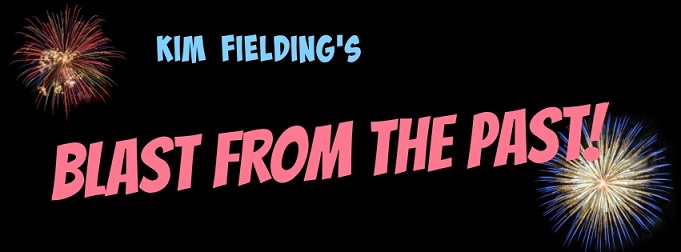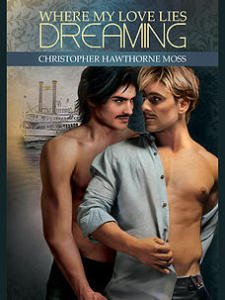Where My Love Lies Dreaming
By Christopher Hawthorne Moss
ISBN-978-1-62380-638-5
As the famous riverboat Le Beau Soleil lazily steams down the mighty Mississippi into the heart of the South, distractions of every sort attempt to pull agent for the Treasury Johnny Stanley away from his assignment. While liquor and gaming are no great temptations, his fascination with Le Beau Soleil’s owner, the debonair Frankie Deramus, means Johnny’s steadfast denial of his attraction to men is no longer feasible. Johnny fights his lust, but when he must come to Frankie’s aid, he can’t ignore his urges any longer. Their passionate love affair falls apart when Johnny refuses to admit two men can be in love. A bitter confrontation between the lovers at a Mardi Gras masquerade forces Johnny to run north. Frankie tries to follow, but the Southern states secede one by one, making it impossible to track Johnny down. The Civil War pits brother against brother and separates lover from lover. When at last the lovers meet again, it’s on the battlefield….
Click to buy in ebook or paperback.
http://www.dreamspinnerpress.com/store/product_info.php?products_id=4096
Reviews
Reviewed by Mel Keegan, author and owner of GLBT Bookshelf www.glbtbookshelf.com
How easy it is to forget that bygone eras were snake-pits of risk for GLBT folk (as other parts of our own world still are). Realistic historical gay fiction is compelled to deal with this; thoughtful historical gay fiction may go further and examine the ramifications and consequences of legal systems which intrude into the bedroom.
Where My Love Lies Dreaming by Christopher Hawthorne Moss is a deeply thoughtful and also thought-provoking novel addressing several questions, of which `How was it to be gay in Civil War era America?’ is but one. The author tackles others, some of them already well explored — such as the issue of slavery — and others touched on more rarely: `What does it actually mean to be American?’ and even, `Are licentiousness and outrageousness necessarily a part of being gay and out?’
One of the most fascinating aspects of the novel, for me, is that while the protagonists are American by birth, culturally they are European. Francois Deramus is Creole, with French roots as deep as any Quebecois; bilingual, with the gentility and sophistication of the French aristocrat as well as a sometimes rashly flamboyant personality. This proves irresistible to the repressed, naïve young man calling himself Johnny Stanley to avoid the prejudice toward immigrants which, in this era, would surely trap him in the ghetto. John Stanley is in fact Johann Steinfeld — Hansi for short: born in Chicago of German parents and as bilingual as Deramus. But unlike `Frankie’ Deramus, who delights in his heritage and his very Frenchness (Creoleness, to be accurate, though to readers beyond American shores `Creole’ is an exotic, evocative word rather than a familiar culture), Stanley is, of economic necessity, a fugitive from his own heritage.
America and Australia have several characteristics in common — forgive me if I speak here from the perspective of the antipodes. Both are nations of immigrants, settled originally and extensively from Europe; both remain young nations by comparison with the countries from which our ancestors arrived only in the last two or three centuries. (And of course immigration continues, often problematically, involving asylum seekers in overwhelming numbers). The wider canvas of American history shows a nation grown from European rootstock, an evolving society at once rich, varied and all the more robust because of its cultural multiplicity. However, what is healthy for a nation can be destructive to an individual. To escape the destiny of an immigrant laborer `Hansi Steinfeld’ will deny his heritage, though it alienates his family. Not only has he changed his name, he has schooled himself to lose the accent, mannerisms and manner of dress that identify him as an immigrant and would imprison him in Germantown. And he is up against tougher obstacles: born gay in an era when homosexuality was worth a life sentence; born Catholic in a time when Catholicism was widely scorned as a kind of religious deviance almost on a par with the aforementioned sexual `deviance.’
The author does not tackle the question of how young Stanley overcame his Catholic upbringing, but he clearly has; the undesired attentions of a priest, in his youth, would have helped. He displays none of the telltale quirks of the Catholic as he leaves home to undertake a fact-finding job for the government — he can pass in a crowd as the heterosexual, homogeneous American Protestant. Only Johnny knows the price he pays for this ability to move unnoticed among the common human herd, and the mask lasts only long enough for him to board a riverboat and blunder into another world … a liberal microcosm revolving around the vessel’s owner, where prejudice is held at bay by one man’s determination not merely to be different, but to make his `one small corner’ different.
Riverboat owner and professional gambler Francois Deramus is as close to `out’ as one could be in 1859. He has an ingenious barometer for gauging the sexual preference of passengers, and dalliance is his delight. Moreover, he is an abolitionist to the limits permissible in his time and place: he makes it difficult for his boat to be used to carry slaves, and though he actually owns his manservant, Albright, and Albright’s wife, he sublimates the relationship into one of an interracial Wooster and Jeeves. Albright is a `gentleman’s gentleman,’ with pride and dignity in himself and his work.
Stepping into Deramus’s utopian milieu aboard Le Beau Soleil — opulent, splendid, sensual — the erstwhile Hansi Steinfeld is doomed. He wages a game fight but seduction is a matter of course as surely as is his flight from the scene, and from the source of his dilemma — because for Stanley, seduction is not liberation, but a descent into shame. Such is his Catholic conditioning that later, meeting Deramus by chance he wonders, albeit fleetingly, if he might reform a man who is joyful in both his sexual freedom and the tiny bubble of liberty he has labored to create in a world filled with the very oppression that continues to make Stanley himself profoundly miserable. The painfully naïve Johnny actually wonders if he can `wean’ Deramus away from the sin of homosexuality — away, and into what? Into Stanley’s own private hell? Fortunately, Deramus is too self-assured, confident in himself and in the microcosm he has built, to be influenced by socio-religious tyranny. Stanley is seduced again before he knows it — also `on the cards’ for a healthy male who has denied his own sensuality until, in fact, sex seems to be on his mind most of the time. The gulf of difference yawning between Deramus, who rejoices in his sensuality, and Stanley, who bears his as a burden, is measured by the unmitigated disaster of Johnny’s exposure to the ebullient, outrageous face of gay identity. Deramus appears to possess no inkling of the intense religious conditioning Stanley wears like armor, and too late discovers his mistake.
The stage is set for the lives of these men to be blown apart by the Civil War. In a world gone completely mad, Deramus will pay handsomely for former liberties taken and enjoyed, and Stanley will discover himself through the bloody rituals of war. To me, this is a fascinating period about which I wish I knew more. I appreciated the way the author unfolds the early days of the conflict through the medium of rumor mill, returning eyewitness, political rhetoric … the newspaper.
For the most part, Where My Love Lies Dreaming is an adroit character play. Events and backdrops weave around the characters rather than the protagonists being driven by events to key locations — until the mid-section of the book, where the plot sparks to life for readers looking for more than romance. Some of the pivotal events of the war are seen through the eyes of Deramus, in particular, and also Stanley. Suffice to say, their lives will never be the same; and you don’t want spoilers here.
The novel is at its most commanding in its historical accuracy, the impressive depth of the research and the very concept of the story driving it. The reader is gifted with a genuine sense of time and place. Most of the Civil War tale is synopsized, told in outline form, which saddened me somewhat because this was the very part of the book that spoke to me, personally — action, conflict, intrigue, danger — rather than the romance, which is extensively developed. However, I realize that in romantic fiction, and perhaps especially in m/m works, there will always be dichotomy: readers who flip past sex to get to plot while others skim plot to find sex. In a novel extending beyond erotica, the author must, per force, try to cater to both camps — also, if those tracts of Civil War synopsis were properly developed, this book would be the size of The Feast of All Saints or Captains and the Kings. (Not that one objects to an epic!) To my mind, it seems one or two important points that should have been developed rather than synopsized were skipped over, but I can’t say more without spoilers; the reader must decide for him- or herself.
On a purely personal note, I was fascinated by New Orleans, about which I know spectacularly little. (One of America’s gay Meccas, razed by a `perfect storm,’ famous for its jazz and sizzling food … all else remains deliciously mysterious.)
The book is beautifully prepared, with the meticulous proofreading one has come to expect from Dreamspinner Press, which is extremely welcome. The writing style is clear, lucid, vivid, only occasionally jarring with a little redundancy and the overuse of names, where a reader yearns for the simple pronoun. Any shortcomings of style blur away into the greater tapestry of the work and are soon forgotten.
I enjoyed this novel a great deal — high praise, since m/m and romance are not my usual reading. Where My Love Lies Dreaming offers much more than what I term `pure romance,’ though a generous part of the book is, admittedly, devoted to particularly explicit erotica. Occasionally, romantic fiction crosses a certain line and succeeds on other levels: this book is a compelling historical too. Highly recommended for readers interested in American history and at the same time hunting for the panoramic story in which gay sex is one of the principle driving forces — where one can choose between the erotic adventures, or the grit and courage of sometimes harrowing human endeavor … and by all means choose both, if you will!
Christopher Hawthorne Moss wrote his first short story when he was seven and has spent some of the happiest hours of his life fully involved with his colorful, passionate, and often humorous, characters. Moss spent some time away from fiction, writing content for websites before his first book came out under the name Nan Hawthorne in 1991. He has since become a novelist and is a prolific and popular blogger; he is the historical fiction editor for the GLBT Bookshelf, where you can find his short stories and thoughtful and expert book reviews. Moss is transgender, having been born with a female body but a male heart and mind. He lives full time as a gay man in the Pacific Northwest with his partner of over thirty years and their doted upon cats. He owns Shield-wall Productions at http://www.authorchristophermoss.com. He welcomes comment from readers sent to christopherhmoss@gmail.com.
Excerpt
Riverboat Le Beau Soleil, November 1860
“You know, it is almost Noël. Will you want to spend that time in Chicago with your father?” Frankie sat on the divan in his sitting room with one arm around Johnny’s shoulders while the latter examined reports.
“No!” Johnny shuddered. He kept reading. Less vehemently he repeated, “No, I don’t think so.”
Frankie frowned at him. “Won’t your father want his son with him for Noël?”
Johnny wriggled uncomfortably. “I suppose. But I would rather spend it with you.”
“I could come with you to Chicago!”
The change in Johnny’s demeanor was marked. “No! Absolutely not!” Shuffling his papers, he made a show of attention to his work and ignored Frankie’s dismayed look.
Frankie abruptly stood and began to pace in the small space. He finally turned and asked, “Are you ashamed of me, Johnny?”
Johnny looked up at him, his eyebrows knitted. He shook his head.
“No, of course not,” Johnny said. “I… I… just don’t want to spend… Christmas where it is freezing and windy.” He realized he had almost said, “Weihnachten.”
Frankie glared at him. “It’s true, isn’t it? You are afraid to be seen with me. I am only un bouffon, un paon to you. In New Orleans you can barely stand to be seen with me. But let your father or friends see me? Mais non. Ça, ce serait de trop!”
Johnny got to his feet and went to him, but Frankie shook him off. “You constantly chide me for being too reckless. Has it ever occurred to you how I feel when you try to stifle me? I go my whole life being exactly who I am. People like me this way. More important, I like me this way. Then suddenly when I find someone I want to be with more than any other person in the world, I have to hide myself.”
Johnny watched him as he began to pace again, gesticulating flamboyantly. “Frankie…,” he began.
“I see, you want me to be your fancy man, but you don’t want anyone else to know it.”
Johnny frowned. Sternly, he essayed, “Frankie, please don’t talk like that.”
Frankie spun on him. “Don’t talk like what? Like someone who cares about you, who wants you, or like some sort of… chichi man?”
“Chichi?”
Frankie leveled an icy glare on him. “You know what I mean.” He mimicked his own florid gestures in an exaggerated way. He glared into Johnny’s nonplussed face, turned and stalked into his bedchamber, loudly slamming and locking the door behind him.
Johnny stood stunned. He went to the door and shouted through it, “Hey, wait a minute. That’s the only way I can get to my stateroom.”
He heard a snort of derision followed by rapid angry French. Frankie called in English, “Then I suppose you will have to let everyone see you sneaking out of the chichi man’s bedroom.” Johnny heard him open the adjoining door and slam it.
He stood, unsure what to do. He turned back and sat again on the divan. Why didn’t Frankie understand? Exposure was dangerous. He may have managed to steam under the bridge until now, but discovery was only a matter of time. If they went to Chicago together, it wouldn’t take a particularly perceptive person to see at once what Frankie was. It would be all over the place in no time. So much for Johnny’s position, his reputation.
A tap sounded on the door that led to the promenade. Johnny leaped to his feet with “And another thing…” on his lips, expecting Frankie, but he opened the door to Charles William. “Oh, it’s you. I suppose he sent you to give me a good talking to.” Johnny turned and went back to the divan and threw himself down on it.
The manservant quietly shut the door behind him. He turned to regard Johnny, his posture his usual elegantly attentive demeanor. “Is there anything I can get for you, Mr. Stanley?”
Johnny shook his head. “I am quite all right the way I am.”
Charles William hesitated, then asked, “Mr. Deramus is clearly angry about something, if I may say so.”
Johnny shot him a look. “That is hardly any of your business, is it?” he stated imperiously.
The manservant nodded. “Yes, you are right, sir. It is not. I beg your pardon.” He reached back to open the door to leave.
“No, stop. That was unfair of me. You’ve known Frankie all his life. Why does he act… that way? Why does he have to be such a… nancy?”
To his surprise, he heard a rumble start from Charles William’s throat that slowly grew into a deep booming laugh. He turned a rueful eye on him.
“You think Mr. Deramus acts like a… nancy?” The rumble continued. “I take it you have never met any nancy boys.”
Johnny glared. “Well, no. I haven’t. I don’t go into that part of town. I have no reason to.”
Charles William cast an indulgent smile on him. “Mr. Deramus does not act like a nancy. He acts like a Creole. They would never admit it in a hundred years, but Creole people have picked up African mannerisms over the time of our close association.”
“But you don’t act like that.”
“You haven’t seen me at Mardi Gras. Most of the time I have to be very solemn and quiet. That’s part of how I survive. But François doesn’t have to hide to survive,” he said, reverting to his master’s familiar name. “He’s free. And that is one thing I admire about him. I thought you did too at first.”



